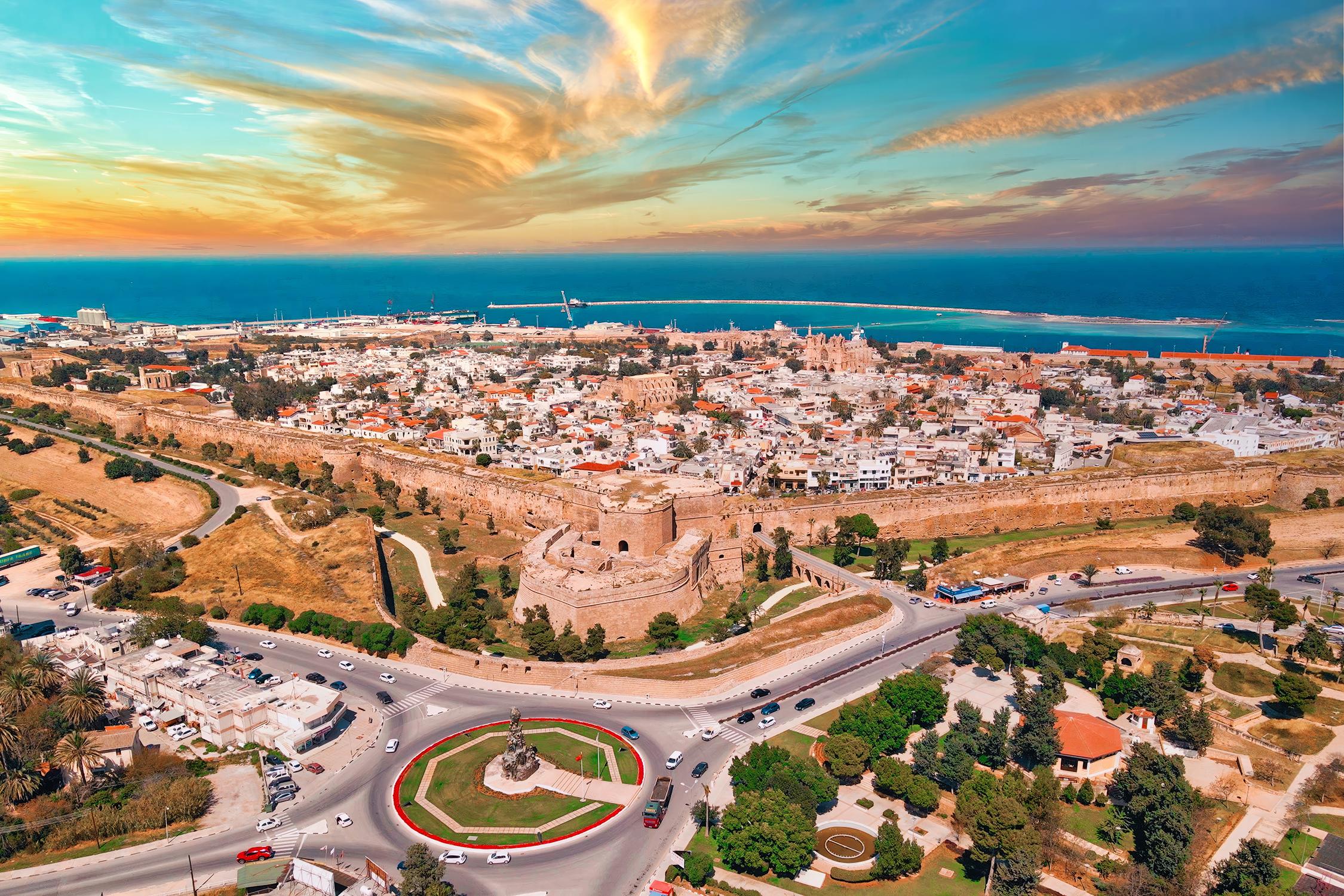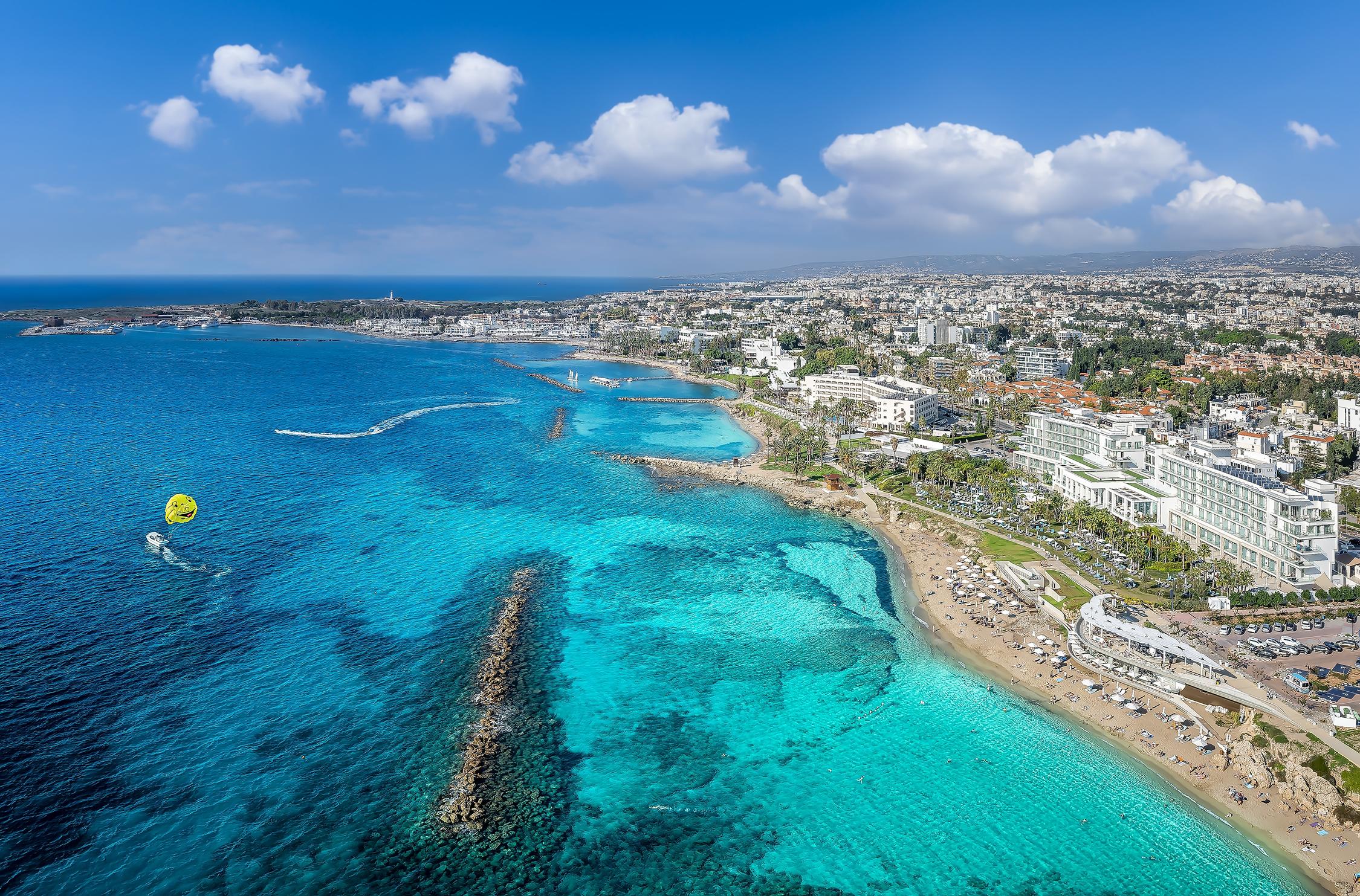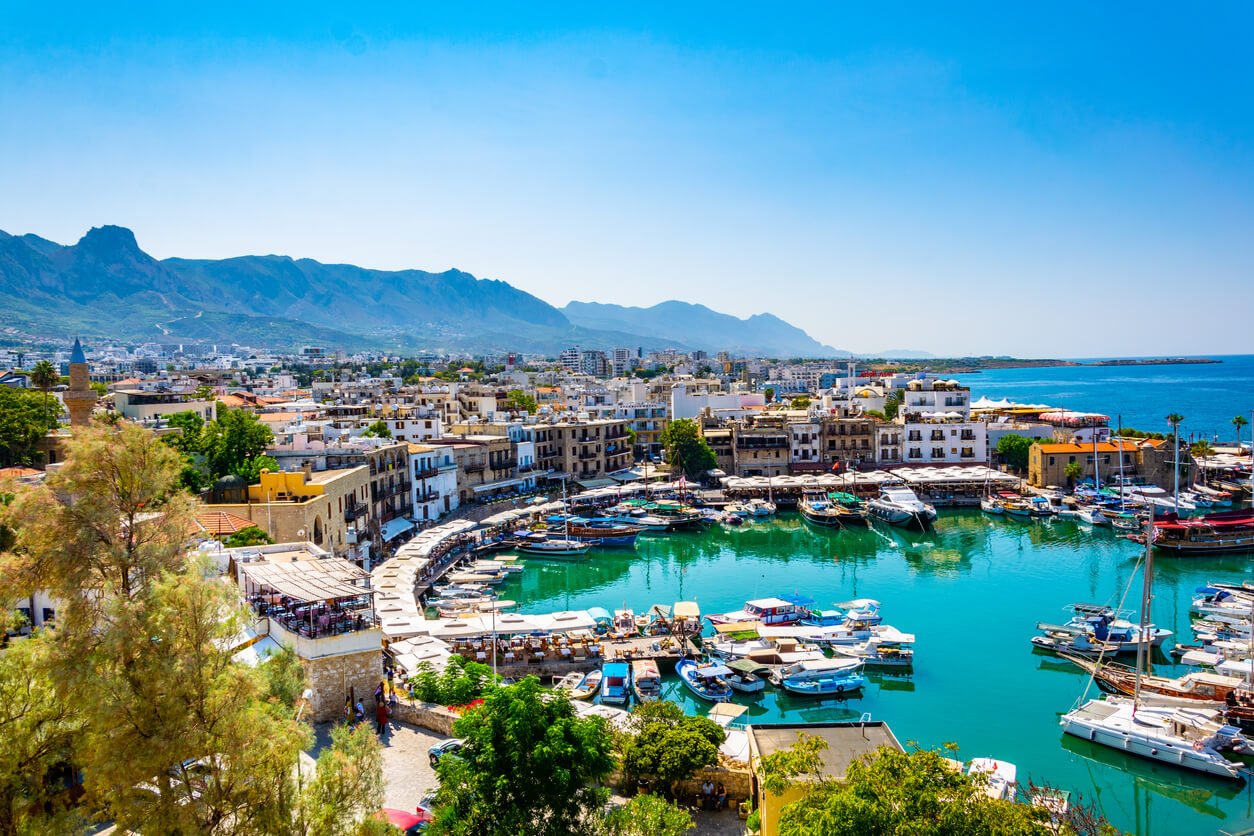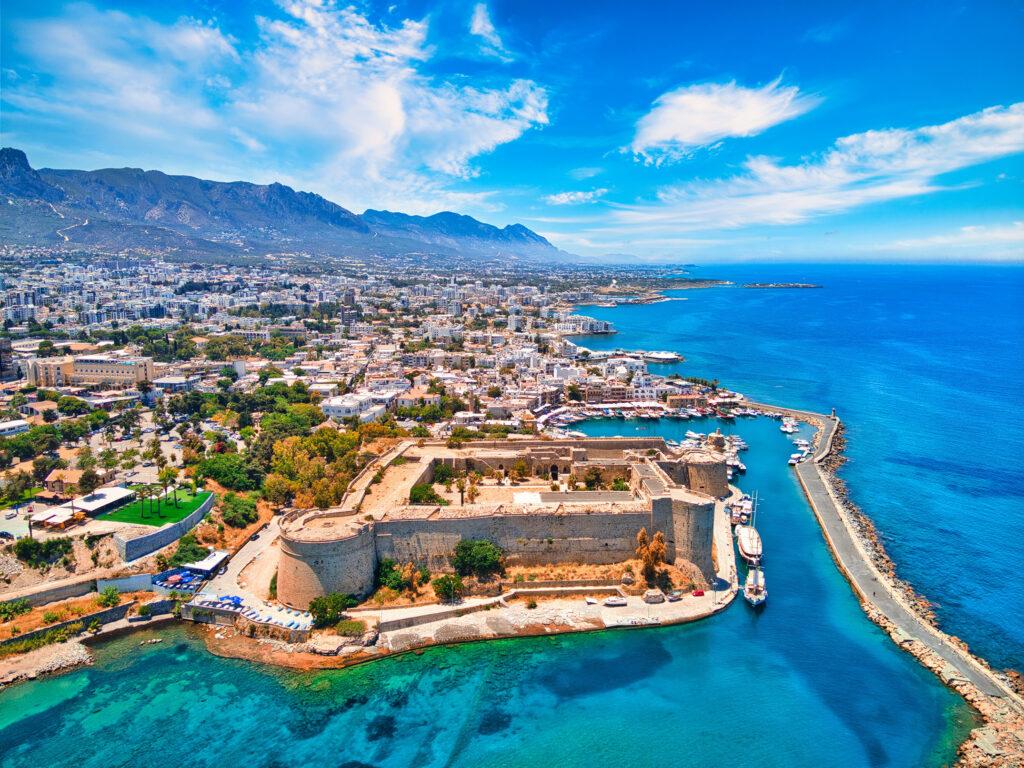
Buying a property in Cyprus is a dream move for many. This tiny Mediterranean island holds the promise of beautiful surroundings, a relaxed way of life and endless hours of sunshine. So, if you’re thinking of investing in property here, this quick read will explore how and why Cyprus is the ideal location.
Reasons to invest in Cyprus
A top holiday destination for many people all over the world, Cyprus is also one of the most popular countries for Brits looking to relocate abroad.[1] But what is it about this island that holds so much charm? Here are our top six reasons:
- It’s a sun-lover’s paradise with nearly 12 hours of sunshine during the summer months and six hours during the winter. With warm sea temperatures lapping the shores, it’s the perfect place to enjoy a more outdoors lifestyle.[2]
- As part of Europe and the Eurozone, Cyprus is a great option for investment due to factors such as ease of travel, a stable currency and favourable business conditions.
- Cyprus has a very generous residency program which is important if you’re looking to relocate permanently or retire here. With a property investment of just €300,000, non-EU residents are free to apply for residency.[3]
- If you’re hoping to buy a holiday rental, then it’s good to know that tourism is an essential part of the Cypriot economy, with an estimated 3.8million visitors in 2023 alone.[4]
- Cyprus has a large expatriate community and is one of the top EU countries for migration.[5] So it’s clear that many people have found a happy and settled home here over the years.
- Although the official languages of Cyprus are Greek and Turkish, English is widely spoken which can help make things easier when you’re in a new environment.
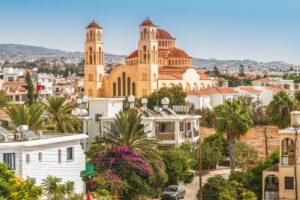
Explore Cyprus
Cyprus is split into six main districts: Nicosia, Paphos, Limassol, Larnaca, Famagusta and Kyrenia.
The Southern coastal towns are the most popular with foreign investors for laid back holiday vibes, while Northern Cyprus offers lower property prices and beautiful rural backdrops.
Nicosia
This is the capital and is the only divided city left in Europe. The majority of Nicosia lies in the Republic of Cyprus, whilst the Northern part is occupied by the Turkish military.
It is the financial centre of the island and has recently seen an influx of many foreign businesses due to the island’s geographical location (it sits between three continents), low start-up costs and taxation policies.[6]
Paphos
A popular holiday destination, Paphos is a coastal city in the southwest of Cyprus. With beautiful beaches, a harbour and an abundance of resorts, this area is also home to ancient architecture and statues. There are plenty of picturesque fishing villages to visit as well as lots of newer towns.
Limassol
The city of Limassol is in the south of Cyprus and a top spot for holidaymakers. It’s the second largest city after Nicosia and boasts a blend of old and new architecture along its sea front.
Each neighbourhood offers something unique. Agios Tychonas is a short drive from the city centre and offers luxury properties, upscale shopping, and fancy restaurants, while Limassol Marina is in the heart of the city and perfect if you’re looking for a sea-view apartment.[7]
Larnaca
The oldest city on the island, Larnaca is popular with tourists but less busy than Paphos and Limassol. There are plenty of beaches and rich historical sites to take in and it’s loved by divers from all over the world due to its shipwrecks and marine life.
There are lots of quaint villages and towns outside the city centre which offer a range of property types for smaller budgets.
Famagusta
This district spans both the Republic of Cyprus and Northern Cyprus and offers an eclectic mix of historical sites – telling the island’s story through its architecture, mosques, and churches.
Kyrenia
The ideal place to explore Northern Cyprus, Kyrenia offers amazing sea views, traditional eateries, and a wealth of historical sites. From its magnificent castle to the tiny harbour, it’s a beautiful old city with plenty of modern conveniences.
Fancy a spot of skiing? Well even that’s possible in Cyprus! The Troodos Mountains in the west offer popular skiing resorts as well as traditional vineyards and forests.
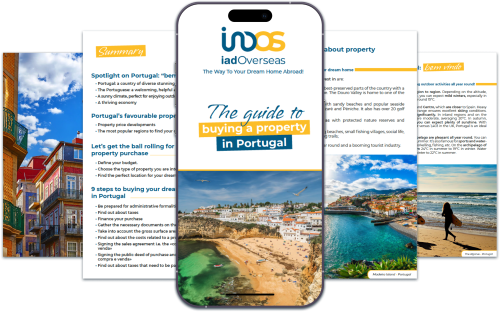
Property market in Cyprus
Since 2015, the property market has seen steady growth. Between January and May 2023, the average property price went up by 10%[8] – great news if you’re planning to hold onto a property and sell later.
In tourist areas such as Limassol and Paphos, property prices have increased above the national average, showing that there’s a high demand for homes in these areas. Apartments are the most popular property types and have seen a higher price rise than other properties.[9]
The below table shows the average cost of apartments in the four main areas of Cyprus in March 2024.
| Area | Price of city centre apartment per m2 (£ equivalent) | Price of apartment outide city centre per m2 (£ equivalent) |
|---|---|---|
| Nicosia | 1,996.38 | 1,571.62 |
| Paphos | 1,854.67 | 1,645.11 |
| Limassol | 3,679.51 | 2,790.16 |
| Larnaca | 2,166.29 | 1,559.41 |
All data has been sourced from Numbeo and was correct at the time of publication.
Although property prices are increasing in Cyprus, it is still more affordable to buy here, than in major cities of the UK. For example, the average cost per m2 for a city centre apartment in London is €16,202.82 (£13,687.69), in Manchester its €4,677.11 (£3,951.09) and in Birmingham €4,544.30 (£3838.90).[10]
Demand for properties is being driven by foreign investors[11] who are attracted by the stable economy, residency options and favourable tax rates. This is reassuring if you’re thinking about buying in Cyprus, as many non-residents have taken the step already.

Buying a property in Cyprus
Buy a property in Cyprus: step-by-step guide
When you’ve found your dream property, you need to follow the correct legal steps to get your purchase moving.
Non-resident’s normally need a deposit of between 30 and 40%.[12] While it is possible to get a mortgage as a non-EU citizen, your bank choices may be more limited than if you were a resident.[13] Get in touch with our iad Overseas property consultants to find out more.
Below, we’ve summarised the process of buying real estate in Cyprus as a non-resident.
- Once you’ve found the property you want to buy, you need to reserve it by paying a non-refundable deposit. This ensures the seller will take it off the market for an agreed length of time.
- Find and appoint a local lawyer. This isn’t a legal requirement, but it will move the purchase process in the right direction.
- The lawyer will carry out the necessary checks (also known as due diligence) to make sure the seller owns and can therefore legally sell the property. This stage is vital to flag up any difficulties such as title issues, building regulations and so on.
- Contracts of sale are drafted and negotiated by your lawyer and the seller’s legal representative.
- Once the contract of sale has been signed, it must be registered with the Land Registry Office. This step protects your interests as a buyer and means the seller can’t transfer the title deed to anyone else. This is also where you, the buyer, pay a percentage of the purchase price.
- Non-EU citizens must apply to the Council of Ministers for ‘permission to acquire immovable property’ in Cyprus. This requires submitting the correct form and is normally granted quite quickly.
- The last step is to pay the outstanding amount and complete the transfer of title deeds at the Land Registry Office.[14]
Taxes when buying a property in Cyprus
As with any property purchase, there are various taxes you will need to pay when buying in Cyprus, detailed below:
- VAT – this is set at 19%, however, this may be reduced to 5% if you meet various requirements.
- Stamp Duty – this depends on the purchase price and is anywhere between 0.15 and 0.2% of the property’s value. It must be paid within 30 days of contract completion.
- Property Transfer Fee – is paid if you buy a property on the secondary market. It ranges between 3 and 8% and depends on the property’s value at the time of purchase.[15]
Tax rules can be difficult to understand so it is important you take professional advice to understand what is owed.
How iad Overseas consultants can help
Whether you’re looking for a bustling, hot city with a vibrant nightlife and holiday feel, or the quiet tranquillity of a traditional village, Cyprus offers the best of both worlds.
To start your property search, get in touch with our iad Overseas property consultants, who can help you find what you’re looking for!

- https://www.aplaceinthesun.com/articles/2023/01/top-10-places-to-buy-abroad-2023
- https://www.visitcyprus.com/index.php/en/practical-info/climate-weather#:~:text=The%20island%20enjoys%20abundant%20sunshine,of%20bright%20sunshine%20per%20day.
- https://imin-cyprus.com/guide/cyprus-property-market-overview/
- https://www.statista.com/statistics/1168571/international-tourist-arrivals-cyprus/
- https://imin-cyprus.com/guide/living-in-cyprus-for-expats
- https://www.centuroglobal.com/blog/top-reasons-to-set-up-a-business-in-cyprus/
- https://www.cyprino.com/posts/unlocking-the-secrets-of-limassol-a-comprehensive-guide-to-the-city-s-best-neighborhoods#:~:text=One%20of%20Limassol's%20most%20exclusive,dining%20establishments%2C%20and%20upscale%20stores
- https://imin-cyprus.com/guide/cyprus-property-market-overview/
- https://www.rics.org/news-insights/market-surveys/cyprus-property-price-index
- https://www.numbeo.com/property-investment/in/Birmingham?displayCurrency=EUR
- https://tranio.com/articles/cyprus-property-market-report-non-eu-residents-drive-strong-demand-for-real-estate-in-december-2023/
- https://www.onlinemortgageadvisor.co.uk/overseas-mortgages/cyprus-mortgage/
- https://imin-cyprus.com/guide/mortgages-in-cyprus/
- https://www.savills.com/landing-pages/guide-to-buying-property-in-cyprus.aspx
- https://imin-cyprus.com/guide/cyprus-property-taxes/

